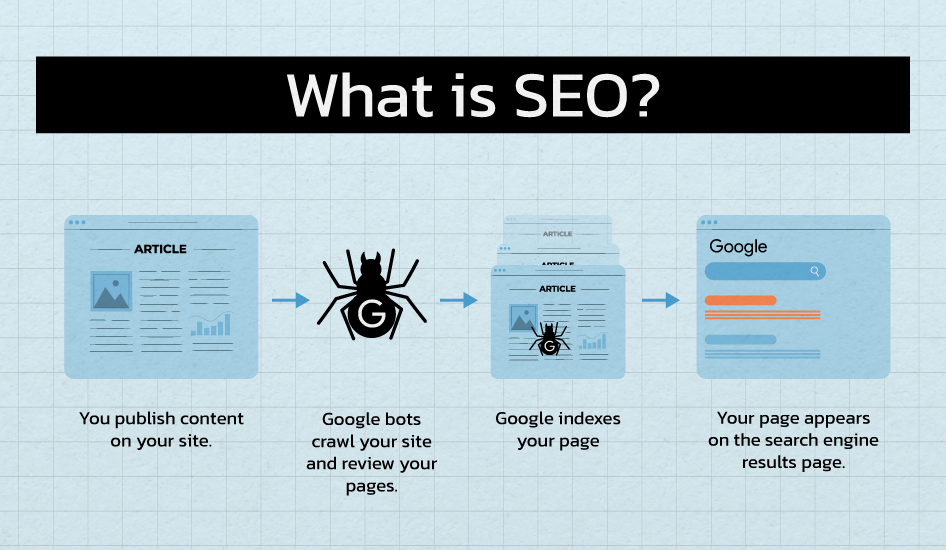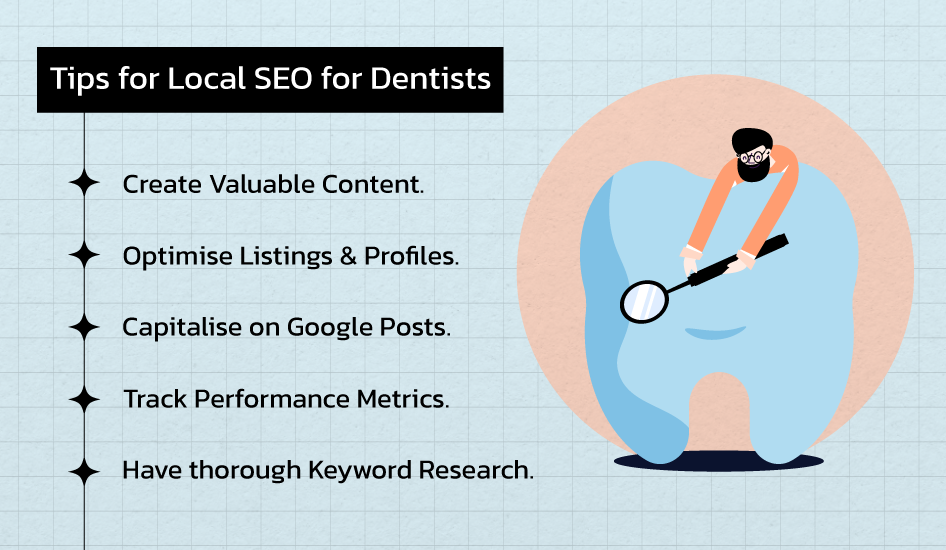Local SEO for Dentists: Tips to Get More Patients

As a small business owner, few things are more important than attracting new customers. When your website was first put online many years ago, the idea of people finding what they were looking for using Google never crossed your mind. Now that almost everyone has access to high-speed Internet at home or work via a desktop computer or mobile device, this method has become one of the most popular ways of connecting with potential clients who may need your services.

If this sounds like something you’d like help doing, I’m happy to point out some simple steps related to Local SEO for Dentists to make your practice show up when someone near your office might be interested in local dental care options!
What is Dental SEO?
Dental SEO is the process of optimizing a dental practice’s website so that it ranks higher in search engine results pages (SERPs) for relevant keywords. This can help dentists attract more new patients and improve their online visibility.
Dental SEO can be a complex and time-consuming process, but it can be a very effective way to attract new patients and grow your dental practice. If you’re not sure where to start with dental SEO, you may want to consider hiring a professional SEO agency to help you.
Why Doctors and Dentists Need Local SEO
As a business owner in the medical or dental field, you know that your online presence is critical to attracting new patients and ensuring long-term success for your practice. If you’re a doctor or dentist, you need to make sure your practice is visible in search results so that potential patients can find you. This is where local SEO comes in.
Local SEO is the process of optimizing your website and online presence so that it ranks higher in search results for local searches. For example, if someone in your area searches for “dentist near me,” you want your practice to appear at the top of the search results.
Why Is Local SEO Important for Dentists?
According to BrightLocal’s 2023 Customer Review Survey, the prevalence of individuals resorting to the Internet as a source of information regarding local establishments has substantially increased from the preceding year. Specifically, statistics showcase an upsurge from 90% in 2019 to 98% last year.
With this finding, there appears to be a notable rise in reliance on online platforms when obtaining details associated with proximate companies.
Furthermore, compared to generic SEO methods, localized SEO brings quicker success, given the reduced level of competition due to geographical constraints. These benefits, combined with the propensity for increased foot traffic at both physical locations and websites alike, make local SEO an optimal choice for dental practitioners seeking to broaden their customer base via the Internet.
6 Proven Tips for Local SEO for Dentists
As a dentist looking to expand your clientele, utilizing Local SEO techniques could prove incredibly beneficial. By enhancing your online presence and ranking higher in regional searches, you stand to gain increased exposure and attract more patients. This guide offers insight into several key Local SEO tips for dentists that could help achieve these goals.

1. Local Landing Pages
People are more likely to find a new dentist online than by word-of-mouth. That’s why it’s so important for dental practices to have a strong online presence.
One of the best ways to do this is to create local landing pages. Local landing pages are web pages that are specifically designed for people who are searching for dental services in your area. They’re a great way to connect with potential patients, provide them with essential information, and encourage them to take action, such as scheduling an appointment or contacting your practice.
Local landing pages are a powerful tool for dental practices that want to connect with local patients and build a strong online presence in their community. If you can create local landing pages that are informative, user-friendly, and location-specific, you’ll be well on your way to connecting with local patients and building a strong online presence in your community.
2. Optimizing Listings & Profiles
Accuracy reigns supreme when it comes to enhancing Local SEO for Dentists’ initiatives. Correctly specifying the practice name, location, contact details, and categorization across multiple directories like Google My Business, Yelp, and Bing Places serves as vital ranking cues for nearby consumers researching options via local searches.
By optimizing these profiles, business owners boost their chances of drawing potential patients from specified areas where they want to dominate search engine results pages (SERPs).
Achieving similar precision with social media accounts also improves brand recognition and online trustworthiness. Sharing routine updates and valuable content across platforms such as LinkedIn, Facebook, Instagram, and Twitter allow practices to capitalise on heightened exposure and improved click-through rates.
Collaborating with experienced organic SEO agencies explicitly designed for dentistry or working alongside skilled marketers knowledgeable about local search tactics guarantees the efficient execution of these critical tasks.
3. Don’t Forget to Capitalize on Google Posts
As a business owner searching for innovative ways to enhance online visibility and attract new clients within specific locations, employing Local SEO for Dentists’ techniques is advantageous. Partnering with a reliable SEO agency for dentists or collaborating with a seasoned SEO marketing agency often yields more fruitful outcomes when compared to attempting solo endeavours needing expert assistance.
Google Posts presents a valuable opportunity for small business owners looking to expand their reach without breaking the bank. By utilising this complimentary application, organisations can disseminate relevant news concerning current offers, forthcoming occasions, or service/product highlights. The content displayed using Google Posts disappears after a week but can include up to ten updates published over seven days.
Frequently refreshing content keeps visitors engaged and helps encourage customer interaction, and fosters potential sales conversions.
To ensure successful implementation, remain mindful of several factors:
- Maintain consistency and relevancy throughout all messages shared
- Limit word count to a maximum of 1500 characters per post
- Include a concise call-to-action linking directly to designated landing pages
- Monitor performance using UTM tracking codes to identify how many clicks stemming from Google Posts translate to actual visitors reaching target destinations listed on your site.
When appropriately executed, Google Posts provide companies an excellent way to communicate essential details rapidly and effectively without draining financial resources.
4. Tracking Performance Metrics
Successfully implementing Local SEO for dental professionals necessitates recognising its importance within the industry. Embracing an efficient SEO agency dedicated to serving dentists can help achieve desired results.
Similarly, partnering with an experienced SEO marketing agency will yield benefits tailored specifically for this niche. The primary goal involves boosting online discoverability via non-paid search channels by focusing on tactics impacting local search rankings within mapped areas. Keeping track of essential metrics like organic search rankings, mobile-friendliness scores, click-through rates, and conversion figures allows monitoring progression and adapting methods as needed.
Tools such as Google Analytics, Search Console, and equivalent web services assist in collecting necessary statistics for review and actionable insights. Continuously analysing and adjusting strategies based on gathered metrics significantly guarantees continued growth and success.
Therefore, tracking key indicators is pivotal in maximising Local SEO effectiveness for dental businesses.
5. Have thorough Keyword Research.
When boosting your practice’s online presence through Local SEO, few aspects matter more than keyword research. Finding and utilizing the right keywords allows search engines to associate specific searches with your dental office, potentially leading interested patients to discover your services.
To excel at Local SEO for dentists, working alongside an experienced SEO agency for dentists represents a smart move. Here we outline how to approach keyword research effectively.
In our context, local keywords differ significantly from traditional ones because they include location-based modifiers (“Near Me,” “City Name”), which distinguish them from generic phrases used elsewhere.
Initially, we must adopt a patient-centred perspective when brainstorming potential search terms by asking ourselves questions like ‘What would patients type into their browsers to locate a reliable dentist?’ This exercise often provides valuable insights directly from those who influence whether your office thrives or struggles.
Remember to monitor your rivals’ activities regarding successful keyword usage, too, as rival practices’ rankings for specific terms indicate their effectiveness in attracting patients via that particular phrase. Combining your newly discovered insights with existing knowledge about your industry allows you to capitalise upon Local SEO opportunities.
6. Local Link Building
One of the most important aspects of SEO for dental practices is link building. Link building is the process of getting other websites to link to your website. When other websites link to your website, it tells search engines that your website is credible and trustworthy. This can help your website rank higher in search results, which can lead to more traffic and new patients.
There are a few different ways to build links for your dental practice. One way is to create high-quality content that people will want to link to. This could include blog posts, articles, or even videos. When you create high-quality content, it’s more likely that other websites will link to it.
Another way to build links is to participate in online communities. This could include forums, social media, or even industry-specific websites. When you participate in these communities, you can build relationships with other people and businesses. These relationships can lead to links back to your website.
Wrap Up
If your practice struggles to attract new clients from its immediate surroundings, implementing Local SEO for Dentists is crucial to improving online visibility and extending patient reach. Following these tips will enable your clinic to secure higher ranks in nearby search result pages and entice more individuals needing specific treatments that match services offered within a given area.
Consider partnering with an SEO marketing agency like NFlow Tech, which specializes in digital marketing to receive personalised recommendations tailored towards industry nuances and regulations.
Expert collaboration ensures effective technical adjustments get implemented accurately while minimising mistakes detrimental to future progress. With our support, your practice witnesses measurable improvements faster by focusing energy on what matters most – delivering exceptional care and unforgettable experiences to loyal patrons.







